Last Updated on 6 months by Francis
When it comes to choosing the right type of heater for your home or office, you may be wondering which option is better – quartz or infrared? Both types of heaters have their own benefits and considerations, making it important to understand the differences between them before making a decision.
In this section, we will compare quartz and infrared heaters in terms of efficiency, cost, and functionality to help you determine which type of heater is more suitable for your needs. By the end of this section, you will have a better understanding of the unique features of each type of heater, allowing you to make an informed decision.
Contents
Key Takeaways
- Choosing between quartz and infrared heaters depends on your specific heating requirements, preferences, and budget.
- Quartz heaters offer fast and efficient heating, but can be more expensive to purchase and maintain.
- Infrared heaters provide gentle and consistent heating, with lower energy consumption and maintenance costs.
- When comparing quartz and infrared heaters, it is important to consider factors such as energy efficiency, cost, and functionality.
- Ultimately, the decision between quartz and infrared heaters comes down to your individual needs and priorities.
Understanding Quartz Heaters
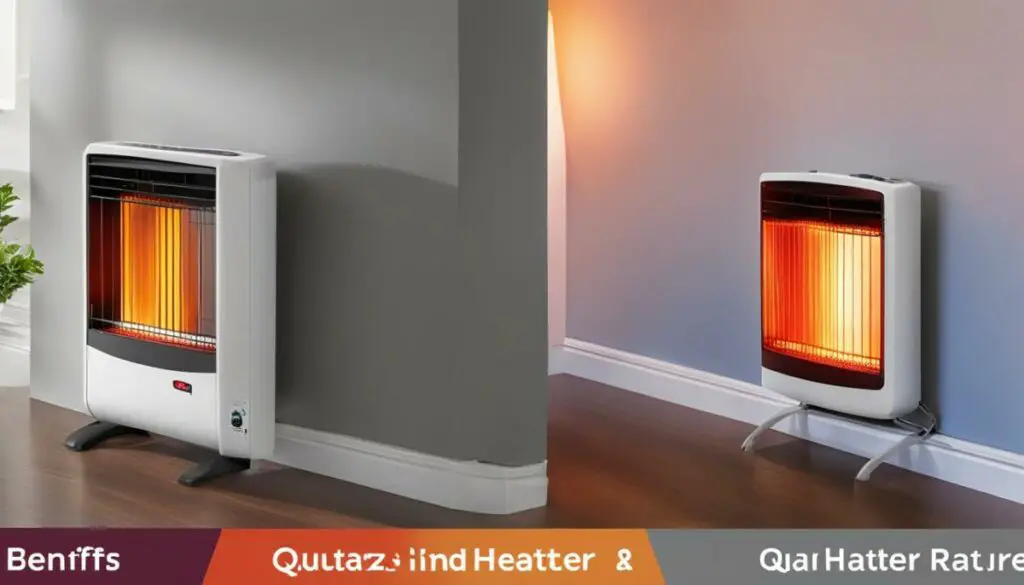
Before deciding on which type of heater is right for your needs, it’s important to understand the advantages and disadvantages of each option. In this section, we’ll take a closer look at quartz heaters.
Pros of Quartz Heaters
There are several benefits to using a quartz heater:
- Instant Heat: Quartz heaters warm up quickly and provide instant heat, making them a good option for those who need warmth immediately.
- Even Heat Distribution: The quartz heating element provides even heat distribution throughout the room, ensuring that all areas are warmed equally.
- Quiet Operation: Quartz heaters operate silently, making them ideal for use in bedrooms or other quiet areas of the home.
Cons of Quartz Heaters
While there are benefits to using a quartz heater, there are also some drawbacks:
- High Operating Costs: Quartz heaters can be expensive to operate, especially if they are used for long periods of time.
- Not Ideal for Large Spaces: Quartz heaters are best suited for small to medium-sized rooms, as they may not provide enough heat for larger spaces.
- Can Be Hazardous: As with any heater, there is a risk of fire or burns if a quartz heater is not used properly.
Overall, quartz heaters can be a good choice for those who need instant, even heat in a smaller space. However, they may not be the most practical option for larger rooms or for those who are looking to save on energy costs.
Exploring Infrared Heaters
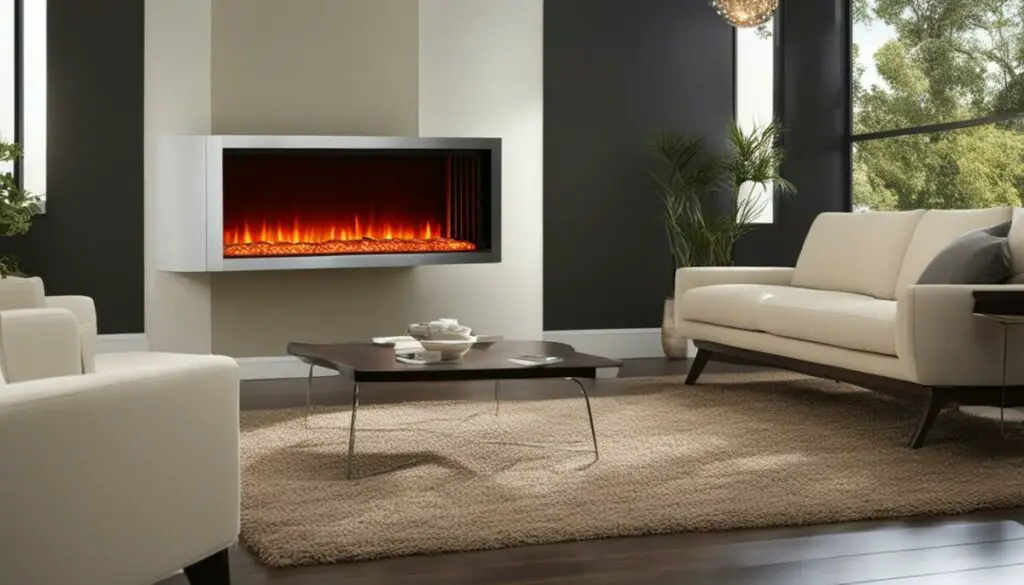
Infrared heaters use electromagnetic radiation to heat objects and people in a room, rather than heating the air. This makes them more energy-efficient than other types of heaters, as they consume less electricity and can heat a room more quickly. Infrared heaters are also known for their portability and versatility, as they come in a variety of shapes and sizes to suit different heating needs.
Pros and Cons of Infrared Heaters
Like any type of heater, infrared heaters have their advantages and disadvantages. Here are some of the pros and cons of using an infrared heater:
| Pros | Cons |
|---|---|
| Energy efficiency – consumes less electricity | Only effective for spot heating – does not heat the entire room evenly |
| Fast heating time – heats up objects and people quickly | Can be expensive to purchase compared to other types of heaters |
| Portable and versatile – can be moved around easily and used in different spaces | May present a higher risk of burns due to their high-temperature operation |
| Low maintenance – no moving parts or filters to clean or replace | May not be the best option for large rooms or open spaces |
Understanding the benefits and drawbacks of infrared heaters can help you determine if they are the right choice for your heating needs.
Benefits of Infrared Heaters
In addition to their energy efficiency and portability, infrared heaters offer a range of benefits that make them a popular heating option. Here are some of the key benefits of using an infrared heater:
- Provides targeted heating – ideal for areas where you spend most of your time
- Can help reduce heating costs by allowing you to turn down the thermostat in unused areas
- Does not dry out the air like traditional heaters, making it a great choice for people with allergies or respiratory issues
- Produces a comfortable and natural heat, similar to the sun’s rays
Overall, infrared heaters are a versatile and energy-efficient heating option that can provide targeted heating for your home or office. By weighing the pros and cons and considering your specific heating needs, you can determine if an infrared heater is the right choice for you.
Efficiency Comparison: Quartz vs Infrared Heaters

When it comes to energy efficiency, both quartz and infrared heaters have their pros and cons. While both types of heaters are designed to provide efficient heating solutions, each has its unique advantages and disadvantages.
Quartz Heater Efficiency
Quartz heaters are highly efficient in terms of heating performance. They are designed to produce heat quickly and distribute it evenly throughout the room. Unlike infrared heaters, which emit heat in a directional pattern, quartz heaters radiate heat in all directions. This means that they can heat up a room faster and more efficiently.
Additionally, quartz heaters are known for their low energy consumption. They can provide the same amount of heat as other types of heaters while using less energy, making them an excellent choice for individuals who are looking to save money on their energy bills.
Infrared Heater Efficiency
Infrared heaters are also known for their energy efficiency. They are designed to emit heat within a specific range of wavelengths, which are absorbed by objects and people in the room. This means that they heat up people and objects directly, rather than heating up the air in the room.
Because of this, infrared heaters are often more energy-efficient than other types of heaters. They can provide heat exactly where it is needed without wasting energy on heating up the air in the room. Additionally, infrared heaters are often equipped with features that allow for precise temperature control, helping to further increase their energy efficiency.
Comparing Efficiency: Quartz vs Infrared Heaters
| Efficiency Factor | Quartz Heater | Infrared Heater |
|---|---|---|
| Heat Distribution | Radiates heat in all directions to heat up a room more quickly and efficiently | Directly heats up objects and people in the room, making it more energy-efficient |
| Energy Consumption | Low energy consumption compared to other types of heaters | Can provide heat exactly where it is needed without wasting energy on heating up the air in the room |
| Temperature Control | May have limited temperature control options | Often equipped with features that allow for precise temperature control, increasing energy efficiency |
Overall, both quartz and infrared heaters offer energy-efficient heating solutions. However, the specific efficiency of each type of heater may vary depending on your specific needs and usage requirements.
Cost Considerations: Quartz vs Infrared Heaters
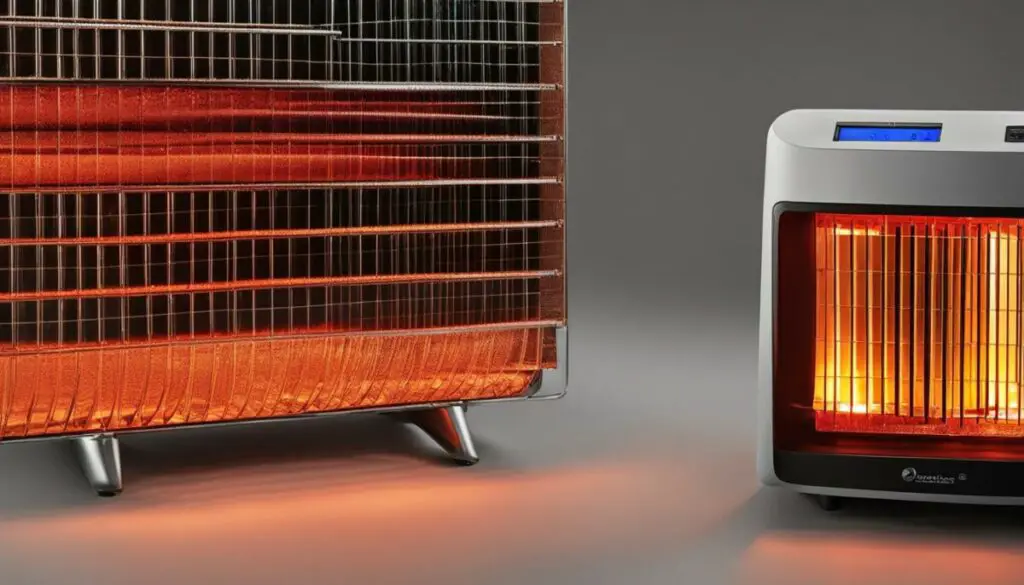
When it comes to choosing a heater, cost is a crucial factor to consider. Here, we will compare the costs associated with quartz and infrared heaters to help you make an informed decision.
| Cost Factor | Quartz Heater | Infrared Heater |
|---|---|---|
| Initial Purchase Cost | Quartz heaters are generally less expensive than infrared heaters, with prices ranging from $50 to $200 depending on the size and features. | Infrared heaters are typically more expensive than quartz heaters, with prices ranging from $100 to $500 depending on the size and features. |
| Maintenance Requirements | Quartz heaters require minimal maintenance, and the bulbs can be easily replaced if they burn out. Replacement bulbs cost around $10 to $20. | Infrared heaters also require minimal maintenance, but the heating elements cannot be replaced. If something goes wrong with the heating element, the entire heater must be replaced. |
| Energy Consumption | Quartz heaters are energy efficient and use less electricity than infrared heaters. They typically consume between 750 and 1500 watts of power. | Infrared heaters are energy efficient, but they use more electricity than quartz heaters. They typically consume between 1000 and 1500 watts of power. |
Overall, both types of heaters offer unique benefits and costs. While quartz heaters may be less expensive and consume less energy, infrared heaters offer a wider range of features and a more intense heat output. Ultimately, your decision will depend on your personal preferences, space requirements, and budget.
Functionality: Quartz vs Infrared Heaters
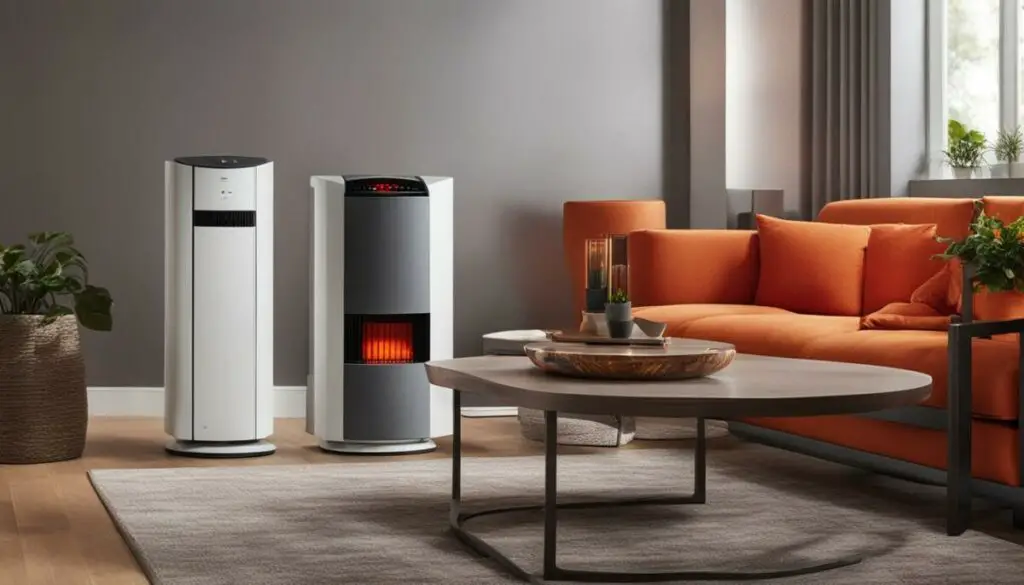
When it comes to functionality, both quartz and infrared heaters have their own unique features and benefits. By examining these factors, you can determine which type of heater is better suited for your specific needs.
Heat Distribution
One of the key differences between quartz and infrared heaters is the way they distribute heat. Quartz heaters emit heat in all directions, making them ideal for small to medium-sized rooms. In contrast, infrared heaters emit heat in a straight line, making them better suited for spot heating or heating larger areas with higher ceilings.
If you have a large room with high ceilings, or if you need to heat a specific area, an infrared heater may be a better option. However, if you have a smaller room that requires even heating, a quartz heater may be the way to go.
Control Options
Both quartz and infrared heaters come with a range of control options. Quartz heaters typically have manual controls that allow you to adjust the heat output and fan speed. Infrared heaters, on the other hand, often come with remote controls that allow you to adjust the temperature and timer settings from across the room.
The type of control you prefer will depend largely on your personal preferences and the specific requirements of your space.
Safety Features
Both quartz and infrared heaters come with a range of safety features to ensure safe operation. Quartz heaters often come with overheat protection and automatic shut-off features, while infrared heaters may have tip-over switches and cool-touch exteriors to prevent burns.
When comparing quartz and infrared heaters, it’s important to consider the safety features that are most relevant to your space and usage requirements.
| Functionality | Quartz Heaters | Infrared Heaters |
|---|---|---|
| Heat Distribution | Even heat distribution in all directions | Straight line heat distribution, better for spot heating or large areas with high ceilings |
| Control Options | Manual controls for heat output and fan speed | Remote controls for temperature and timer settings |
| Safety Features | Overheat protection and automatic shut-off features | Tip-over switches and cool-touch exteriors to prevent burns |
Comparing the functionality of quartz and infrared heaters can help you determine which type of heater is better suited for your specific requirements.
Choosing the Right Heater for You

Choosing between quartz and infrared heaters can seem overwhelming, but it doesn’t have to be. By considering a few key factors, you can easily determine which type of heater is more suitable for your needs.
Room Size
The first factor to consider is the size of the room you will be heating. If you have a smaller room, a quartz heater may be more suitable. These heaters are designed to provide concentrated heat in a smaller area. However, if you have a larger room, an infrared heater may be a better choice. These heaters are capable of providing heat to a larger area, making them more efficient in larger spaces.
Heating Requirements
Another factor to consider is your heating requirements. Do you need a heater that can warm up a room quickly, or do you prefer a heater that can maintain a consistent temperature over a longer period of time? If you need quick heat, an infrared heater may be the better choice, as they can heat up a room faster than quartz heaters. However, if you prefer consistent temperature, a quartz heater may be more suitable, as they provide a more consistent heat output over a longer period of time.
Personal Preferences
Finally, it’s essential to consider your personal preferences. Do you prefer a heater that is more energy-efficient, or do you value the convenience of a heater that is easy to control? If energy efficiency is your top priority, an infrared heater may be a better choice, as they tend to be more energy-efficient than quartz heaters. However, if convenience is more important, a quartz heater may be the better choice, as they are typically easier to operate and control.
By considering these factors, you can choose the type of heater that is more suitable for your needs. Keep in mind that both quartz and infrared heaters have their advantages and disadvantages, and ultimately, your choice will depend on your specific requirements and preferences.
Key Considerations in Quartz vs Infrared Heater Comparison

Before making a decision between quartz and infrared heaters, it’s essential to weigh their pros and cons. Both types of heaters have unique features that make them suitable for specific heating needs. Below are some of the key considerations to keep in mind when comparing quartz and infrared heaters:
Pros and cons of quartz and infrared heaters
Quartz heaters are known for their fast heating capabilities, making them suitable for small to medium-sized rooms. They are lightweight, portable and have a longer lifespan compared to other types of heaters. However, they can be expensive and emit a bright light that may be bothersome to some users.
Infrared heaters, on the other hand, are highly energy-efficient and provide gentle, radiant heat that evenly warms the space. They do not produce any light, making them ideal for use during sleep or in low light conditions. However, they take longer to heat up and may not be suitable for large rooms.
Heating performance of quartz and infrared heaters
Quartz heaters use a combination of radiant and convection heating to warm the air and objects in the room. This type of heating is fast and efficient, but it can result in uneven heating. Infrared heaters, on the other hand, use radiant heating to directly warm the objects in the room, resulting in even heat distribution and comfortable warmth. However, this type of heating is slower and may take some time to warm up the room.
| Pros | Cons | |
|---|---|---|
| Quartz Heaters | Fast heating, portable, longer lifespan | Expensive, emits bright light |
| Infrared Heaters | Energy-efficient, even heat distribution, no light emission | Slow heating, may not be suitable for large rooms |
By considering the pros and cons, as well as the heating performance of quartz and infrared heaters, you can choose the heater that best meets your heating needs.
Making Your Decision: Quartz or Infrared Heater?
After exploring all the key aspects of quartz and infrared heaters, it’s time to make your decision. Both types of heaters have their own advantages and disadvantages, and the best option for you depends on your personal needs and preferences. To recap, let’s consider the factors you should keep in mind when choosing between quartz and infrared heaters:
- Efficiency: Consider the energy consumption and heating capabilities of each type of heater to determine which is more efficient.
- Cost: Evaluate the initial purchase cost, maintenance requirements, and long-term energy consumption to determine which type of heater is more cost-effective.
- Functionality: Consider factors such as heat distribution, control options, and safety features to determine which type of heater better suits your needs.
When making your decision, it’s important to keep in mind the specific heating requirements of your space. For smaller areas, a quartz heater may be more suitable due to its focused heat output. For larger spaces, an infrared heater may be a better option due to its ability to heat large areas evenly.
Ultimately, the decision between quartz and infrared heaters comes down to your personal needs and preferences. Consider the key factors discussed in this article and weigh them against your requirements to determine which type of heater is right for you.
“The decision between quartz and infrared heaters comes down to your personal needs and preferences.”
Remember, whether you choose a quartz or infrared heater, both options offer effective heating solutions for your home or office. Make your choice with confidence by carefully evaluating the information presented in this article.
Conclusion
After evaluating the information presented in this article, you can now make an informed decision on whether to choose a quartz heater or an infrared heater. Both types of heaters have their advantages and disadvantages, and the choice ultimately depends on your specific requirements and budget.
Considerations for Choosing the Right Heater
Before making your final decision, consider the following factors:
- Room Size: For smaller rooms, a quartz heater may be sufficient, while larger rooms may require an infrared heater for more efficient heating.
- Heating Requirements: If you require heating for longer periods, a quartz heater may be more suitable, while an infrared heater may be better for short bursts of heating.
- Budget: Consider the initial purchase cost, maintenance requirements, and energy consumption to determine the long-term cost of each type of heater.
- Personal Preferences: Take into account factors such as noise levels, aesthetics, and control options to find the heater that best suits your needs.
Final Thoughts
Both quartz and infrared heaters can provide efficient heating solutions for your home or office. By considering the key factors, you can confidently choose the heater that is better suited for you.
Thank you for reading this article, and we hope it has been helpful in your decision-making process. Stay warm and comfortable with your new heater!
FAQ
Which type of heater is more energy efficient, quartz or infrared?
Both quartz and infrared heaters are known for their energy efficiency. However, infrared heaters are typically considered more efficient as they can directly heat objects and people in the room, instead of wasting energy on heating the air.
What are the main advantages of quartz heaters?
Quartz heaters offer instant heat, they are compact and portable, and they can provide focused heat to a specific area. They are also known for their durability and can withstand high temperatures.
What are the benefits of using infrared heaters?
Infrared heaters provide efficient and targeted heating, they operate silently, and they do not reduce humidity levels in the room. They can also help alleviate allergy symptoms by reducing airborne particles.
How do quartz and infrared heaters compare in terms of cost?
Quartz heaters are generally more affordable upfront, while infrared heaters may have a higher initial cost. However, infrared heaters are often more energy-efficient, resulting in potential long-term cost savings on energy bills.
What is the main difference in functionality between quartz and infrared heaters?
Quartz heaters primarily emit heat from heated coils, while infrared heaters emit infrared radiation that directly heats objects and people in the room. Infrared heaters provide more targeted and efficient heating compared to quartz heaters.
How do I choose the right heater for my needs?
When choosing between quartz and infrared heaters, consider factors such as room size, heating requirements, and personal preferences. Determine if you need more focused or widespread heating and evaluate the specific features and benefits of each type of heater.
What are the key considerations to keep in mind when comparing quartz and infrared heaters?
It’s important to consider the pros and cons of each type of heater, evaluate their heating performance, and assess factors like energy efficiency, cost, functionality, and safety features. The key is to prioritize your specific heating needs and preferences.
How can I make the final decision between quartz and infrared heaters?
After considering the information presented in this article, weigh the efficiency, cost, functionality, and other relevant factors against your specific requirements. This will help you make an informed decision and choose the heater that best suits your heating needs.




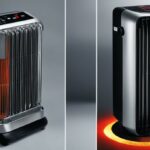
.jpg)



